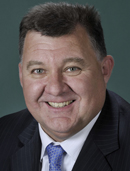
People in blue shirts fill the room. Laughter and balloons are flying in the air. The mood is high. The colours vivid. Then the laughter and cheer silence as a man beholding a big smile enters the room. ‘I’m pleased to report the seat of Hughes is in safe Liberal hands,’ the man announces. The room erupts with cheers and applause.
This was a Saturday night at the Royal Hotel in Sutherland, nearly two years ago. Just one year into his career as a politician, Craig Kelly was elected to the
House of Representatives for Hughes, New South Wales.
On this winter night, the excitement was intoxicating. Only a 0.8 per cent swing was needed for Labor to take over the seat of Hughes. Opposite Craig Kelly stood Brent Thomas, a Commonwealth Bank senior vice-president, who had run a formidable campaign.
In the end, however, Craig Kelly polled 36,547 of the 97,995 votes in the vast electorate, giving him a winning margin of 5.17 per cent. The seat of Hughes was his.
The journey to this seat started in Sydney in 1963, where Craig Kelly was born. He grew up with his brothers and sister, and believes that his parents’ love, support and belief in working hard instilled in him, his political values. Today, Kelly resides in Illawong, south of Sydney, with his wife Vicky, and his two teenage children Tara and Trent.
Having only been in parliament for two years, Craig Kelly’s biggest challenge so far has been to familiarise himself with parliamentary procedures. However, Kelly sees it as a political strength that the majority of his life was spent outside the political system.
Craig Kelly previously worked as a local business owner in the manufacturing and trade sector, and his political interest remains in this field. He emphasised this in his first speech in the House of Representatives, where he stated: ‘Thank you for giving me the chance to have my say on behalf of small business and consumers.’
In this speech, held on 15 November 2010, he explained that the current legislative settings of competition policy in Australia make for a future where a few giant corporations will control all necessities of life. He therefore sees anti-competitive price discrimination as the biggest challenge for small business today and into the future.
His political vision is to fight for small businesses and their protection, saying: ‘I often hear the mantra that small business is the backbone of our economy, but it is not only that. It is also the backbone of our society and provides an immeasurable element of strength to our nation.
‘We must never overlook the fact that the free market — more accurately, the free enterprise system — does not arise naturally. It is a system, like our democracy, that must be protected by a set of rules and, also like our democracy, one that we must be ever vigilant to protect.’
In order to protect small businesses, one of Kelly’s key interests has been to install closed circuit television cameras in crime hot spots in the CBD of Liverpool. These CCTV cameras are placed outside shops and enhance safety, he says.
The Liberals have pledged that funding for the cameras would come from the Coalition’s $50 million national crime prevention program. When it was announced that Liverpool would receive crime prevention cameras from the Liberals, Kelly emphasized the value of the news: ‘The cameras will provide vital information to police to help them crack down on vandalism and anti-social behaviour. People going about their daily lives deserve to feel safe in their community.’
However, Mayor Wendy Waller (ALP) of the Liverpool city council believes that the discussion of safety has lost its focus.
She said: ‘I see safety and crime to be a police issue. I think that people are starting to believe that everything is the responsibility of local government and they aren’t taking responsibility for themselves.
‘The issue of crime in the CBD is very much a police matter, and the issue to cost shifting the cameras to local governments is the real concern.’ Waller reiterates: ‘The police are responsible for the crime issues in the CBD – not the local government.’
A report from the council estimated the cost of installing 24 cameras in the CBD to be $400,000 and the cost of maintaining them each year to be $139,700. Mayor Waller feels that the external funding that Craig Kelly is referring to isn’t ready to cover these costs, and fear that they must be borne by the council.
Instead of giving the local government the entire bill, Waller suggests that Kelly should arrange a state or federal initiative that would assist small businesses in covering the costs of security, as a lifeline from the state is needed.
To this, Craig Kelly explains that the council’s budget has set aside more than half a million dollars for the installation of CCTV cameras, but unfortunately has spent the money elsewhere. ‘If the coalition had won government at the 2010 election, we would have those CCTV cameras in Liverpool today,’ Kelly states.
Three years into the job as a Liberal politician, MP Craig Kelly is working towards his vision of improving the conditions for small businesses. Whether the small businesses of Liverpool will be safe under the CCTV camera lenses and whether the rookie-politician will be successful in his new field, will remain questions unanswered.
Mayor Waller concludes: ‘We’ll just have to wait and see won’t we?’
Anne Nielsen is a student at La Trobe University. You can follow her on Twitter: @AnneRyvang
To view profiles of some of the other backbenchers as part of upstart’s Backbench Insiders project, click here.






